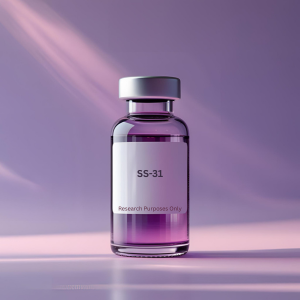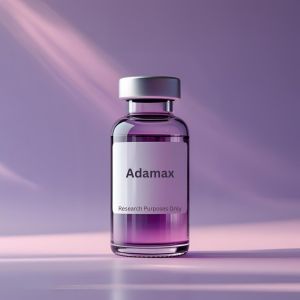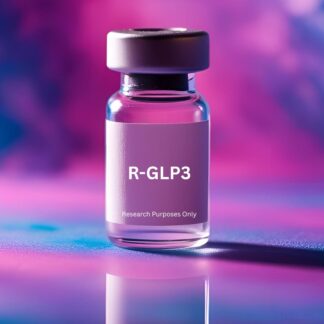Free shipping on orders over $250
SS-31
Price range: $160.00 through $175.00
SS-31
SS-31, also known as elamipretide, is a synthetic tetrapeptide with the sequence D-Arg-Dmt-Lys-Phe-NH2. Unlike many other peptides that work on surface receptors, SS-31 was engineered to specifically target the mitochondria — the energy-producing organelles inside cells.
Important Notices:
- This product is sold for scientific research purposes only.
- Product is provided as a lyophilized (freeze-dried) powder in a sealed, sterile vial.
- The quantity on the label refers to the total amount of product inside each vial.
- Additional lab supplies are required for conducting research such as bacteriostatic water for reconstitution, syringes & needles to draw from the vials, and alcohol prep pads for sanitizing vial stoppers prior to needle insertion. These are sold separately.
- Vial appearance, label, seal and cap colors may vary from product photos.
Description
Originally developed in the early 2000s, SS-31 has been investigated for its role in treating age-related diseases, heart failure, and mitochondrial disorders. More recently, it has gained interest in the longevity, recovery, and performance space due to its ability to restore mitochondrial function and reduce oxidative damage at the cellular level.
Research suggests the following potential benefits:
Cognitive – reversing mitochondrial dysfunction in the hippocampus, the part of the brain responsible for memory and learning.7 This reversal, in turn, helped regulate the signaling of brain-derived neurotrophic factor, an essential protein for neuronal function
Alzheimer’s Disease: Mitochondrial dysfunction appears to be a central event in the pathogenesis of Alzheimer’s disease, so the preservation of mitochondrial health may be one of the keys to disease prevention
Stroke & Traumatic Brain Injury: After a stroke or traumatic brain injury, oxidative stress can accumulate in the brain and lead to worse health outcomes. This is known as secondary brain injury. SS-31 administration helped normalize levels of an enzyme associated with cerebral oxidative stress after mild brain trauma
Atherosclerosis Atherosclerosis refers to a hardening of the arteries. It results, in part, from oxidative stress that activates inflammatory cells. SS-31’s antioxidant action, it can potentially decrease one’s atherosclerotic risk
Muscle function: reverse age-related decline in mitochondrial ATP production, allowing for improvements in subjects’ exercise tolerance and a restoration of redox homeostasis (a balance between pro-oxidants and antioxidants that promotes proper muscle generation and function)
Glaucoma: Since oxidative stress and mitochondrial dysfunction appear to contribute to RGC death, researchers have looked to SS-31 as a potential glaucoma treatment.
Additional information
| CONTENT (mg) | 40mg, 50mg |
|---|




